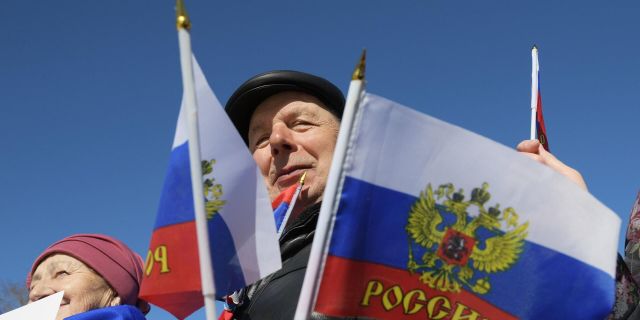Is diplomacy between Russia and the West possible?
It is necessary to deal with the Russia that exists, and not with the one that we would like to see, and therefore diplomacy is needed in relations with it, writes Project Syndicate. To begin with, the United States and its partners should limit their goals in Ukraine, the author of the article believes. This means, in particular, refusing to talk about regime change in Moscow.
Richard Haas
New York - For more than two months of close media attention to the situation in Ukraine, one story has gone virtually unnoticed. At the end of April, the United States and Russia conducted a prisoner exchange. Russia has released an American (a former marine) whom it detained about three years ago, and the United States has released a Russian pilot imprisoned more than a decade ago on drug smuggling charges.
It is noteworthy that this exchange took place at a time when Russia's special operation in Ukraine brought its relations with the United States to the lowest point since the end of the Cold War. The US has chosen to avoid direct military involvement in the situation, but it is doing a lot to influence its trajectory, including providing Ukraine with a huge amount of increasingly modern weapons, intelligence and training so that it can successfully resist and potentially defeat Russian forces. The United States has also taken steps to strengthen NATO and imposed tough economic sanctions against Russia.
Hostilities are likely to drag on for some time. Although Ukraine's fundamental interest lies in stopping them and preventing new deaths and destruction, President Volodymyr Zelensky's desire for peace is conditional. He seeks to return the territory occupied by Russia and ensure respect for the country's sovereignty so that, among other things, Ukraine can join the European Union. He also wants those responsible for war crimes to be brought to justice.
Russian President Vladimir Putin, for his part, needs to achieve results that justify his costly invasion, otherwise he will look weak and face internal problems. It is unlikely that peace will be achieved through negotiations that would bridge the gap between these two seemingly irreconcilable positions. It is much more likely that the conflict will last not months, but years. This will become the backdrop for the relations of the United States and the West with Russia.
One of the possibilities for the West is to link all relations with Russia with Russia's actions in Ukraine. However, this would be a mistake, since Russia can influence other Western interests, such as limiting the nuclear and missile capabilities of Iran and North Korea, as well as the success of global efforts to limit emissions that lead to climate change.
The good news is that, as the prisoner exchange shows, deep disagreements over Ukraine do not necessarily preclude doing mutually beneficial business if both sides are ready for separation. But protecting the possibility of selective cooperation will require sophisticated, disciplined diplomacy.
To begin with, the United States and its partners will have to prioritize and even limit their goals in Ukraine. This means refusing to talk about regime change in Moscow. We need to deal with the Russia that we have, and not with the one that we would prefer to see. Putin's position may be challenged from within (or he may, as reported, have health problems), but the West is not in a position to provoke his resignation, let alone guarantee that someone better will replace him.
Similarly, Western governments would be wise if they put off talking about war crimes tribunals for high-ranking Russian officials and stopped bragging about helping Ukraine track high-ranking Russian generals and ships. The war and investigations are ongoing, and the Russians should see some benefit in acting responsibly. The same applies to reparations.
Similarly, despite the fact that Russia is likely to be in a worse economic and military situation as a result of the outbreak of this war, the US government should make it clear that, contrary to the remarks of Defense Secretary Lloyd Austin, America's goal is not to use the situation to weaken Russia. On the contrary, the United States should emphasize that they want the military operations to end as soon as possible on conditions reflecting the sovereign and independent status of Ukraine.
As for the situation in Ukraine, the West should continue to support it and prevent escalation by avoiding direct hostilities. The Kremlin, however, should be made clear that this restraint comes from the fact that it will not expand them to NATO countries or use weapons of mass destruction, after which such restrictions voluntarily imposed by the West will disappear.
The West should also think carefully about its military goals and how to achieve them. The goal should be for Ukraine to control its entire territory, but this does not necessarily justify attempts to liberate Crimea or even the entire eastern region of Donbass by military force. Some of these goals are more expedient to achieve through diplomacy and selective easing of sanctions. But until Russia's behavior changes, sanctions should not just remain in force, but also apply to energy imports that finance Russia's military actions.
Diplomacy is a tool of national security, not a service that should be provided, and it should continue to be used in relations with Russia. It is necessary to restore private meetings between high-ranking civilian and military officials of Western countries and Russia in order to reduce the risk of miscalculations that could lead to confrontation or worse, and explore opportunities for limited cooperation.
It cannot be ruled out that constructive relations with Russia will appear only in the post-Putin era. But this in no way cancels the interest of the West in ensuring that relations do not fall below a certain level.

